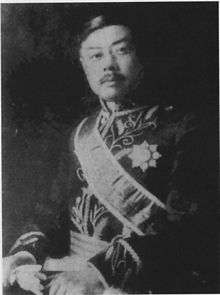Yan Huiqing
Yan Huiqing (Wade–Giles: Yen Hui-Ch'ing, (also Weiching Williams Yen or simply W.W. Yen) 顏惠慶 (2 April 1877 – 24 May 1950) was a Chinese politician who served as Premier and later President of the Republic of China in the 1920s. He was also an accomplished linguist.
Yan Huiqing | |
|---|---|
 | |
| Premier of the Republic of China | |
| In office 13 May 1926 – 22 June 1926 Acting | |
| Preceded by | Hu Weide |
| Succeeded by | Du Xigui |
| In office 14 September 1924 – 31 October 1924 | |
| Preceded by | Wellington Koo |
| Succeeded by | Huang Fu |
| In office 11 June 1922 – 5 August 1922 | |
| Preceded by | Zhou Ziqi |
| Succeeded by | Tang Shaoyi |
| In office 25 January 1922 – 8 April 1922 | |
| Preceded by | Liang Shiyi |
| Succeeded by | Zhou Ziqi |
| In office 18 December 1921 – 24 December 1921 Acting | |
| Preceded by | Jin Yunpeng |
| Succeeded by | Liang Shiyi |
| President of the Republic of China Acting | |
| In office 13 May 1926 – 22 June 1926 | |
| Preceded by | Hu Weide (Acting) |
| Succeeded by | Du Xigui (Acting) |
| Personal details | |
| Born | 2 April 1877 Shanghai, Qing Dynasty |
| Died | 24 May 1950 (aged 73) |
| Political party | Anhui clique |
| Education | University of Virginia (B.A.) Peiyang University (D.Litt.) |
Biography
A native of Shanghai and a graduate of the University of Virginia (where he received prizes and medals for debate, and was elected to Phi Beta Kappa), he taught English at St. John's University, Shanghai for a short time after coming back from the United States, where he became a Freemason, and then went to Beijing to start his political career.[1] In 1906, he became an editor at the Commercial Press, received a D.Litt. from the Peiyang University (now Tianjin University), and was appointed to the Imperial Ministry of Education.
He served as Foreign Minister,[2] premier (and acting premier) five times and as acting president during his last premiership in 1926. Wu Peifu handpicked him for the acting presidency to pave the way for Cao Kun's restoration, and he set up a cabinet in anticipation,[3] but he was unable to take office due to Zhang Zuolin's objection. When Yan finally took his post, he immediately resigned and appointed navy minister Du Xigui as his successor.
A veteran diplomat, he was China's first ambassador to the Soviet Union,[4] and a delegate to the Washington Naval Conference[5] and the League of Nations; he also served as a diplomat to Germany, Sweden, Denmark, and, finally, the United States,[6] where he denounced the Japanese invasion of Manchuria.[7] During World War II, he translated and compiled Stories of Old China in Hong Kong while under Japanese house-arrest in 1942. He took his first plane trip in 1949 to Moscow in hopes of resolving the Chinese Civil War.
He died in May 1950, survived by his widow and six children.[8]
References
- Biographical Dictionary of Chinese Christianity Yan Huiqing Bio Retrieved February 22, 2015
- "Yen Makes Way for Koo at Peking". The New York Times. 1922-05-29. ISSN 0362-4331. Retrieved 2018-03-09.
- "NEW CABINET RULE IS SET UP IN PEKING; Group Will Act Without President of Republic, Backed by Wu and Chang Armies. DR. W.W. YEN IS PREMIER Wellington Koo Gets Finance Portfolio and Sze Is Slated for Foreign Minister". The New York Times. 1926-05-14. ISSN 0362-4331. Retrieved 2018-03-09.
- "NEW CHINESE ENVOY ARRIVES IN MOSCOW; Dr. Yen Doubts Soviet Will Join League's Committee of 19 -- Sees Hard Task Before Him". The New York Times. 1933-03-06. ISSN 0362-4331. Retrieved 2018-03-09.
- "CHINA'S DELEGATES START.; Dr. Yen, Foreign Minister, Will Be Chief Representative in Washington". The New York Times. 1921-09-30. ISSN 0362-4331. Retrieved 2018-03-09.
- "DR. YEN SAYS JAPAN CHALLENGES WORLD; New Chinese Envoy at Washington Holds Tokyo Has Designs on Manchuria". The New York Times. 1931-12-21. ISSN 0362-4331. Retrieved 2018-03-09.
- Yen, W. W (1932-03-27). "WHAT MANCHURIA MEANS TO CHINA'S FUTURE; Minister Yen Advances the Republic's Needs as Against Those of Japan". The New York Times. ISSN 0362-4331. Retrieved 2018-03-09.
- "DR. W.W.YEN DIES; CHINESE DIPLOMAT; Former Premier and Foreign, Minister Had Been Envoy to U.S., Britain and Russia". The New York Times. 1950-05-26. ISSN 0362-4331. Retrieved 2018-03-09.
External links

| Political offices | ||
|---|---|---|
| Preceded by Jin Yunpeng |
Premier of the Republic of China 1921 |
Succeeded by Liang Shiyi |
| Preceded by Liang Shiyi |
Premier of the Republic of China 1922 |
Succeeded by Zhou Ziqi |
| Preceded by Zhou Ziqi |
Premier of the Republic of China 1922 |
Succeeded by Wang Chonghui |
| Preceded by Gu Weijun |
Premier of the Republic of China 1924 |
Succeeded by Huang Fu |
| Preceded by Hu Weide |
President of the Republic of China 1926 |
Succeeded by Du Xigui |